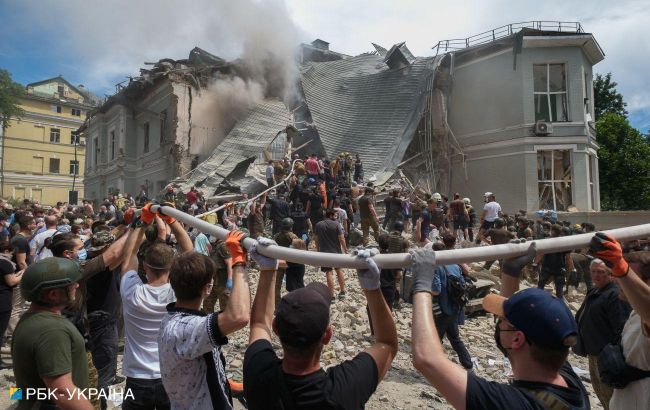Russian general's name who commanded strike on Okhmatdyt revealed
 Photo: Russian General ordered the shelling of Okhmatdyt in Kyiv (Vitalii Nosach, RBC-Ukraine)
Photo: Russian General ordered the shelling of Okhmatdyt in Kyiv (Vitalii Nosach, RBC-Ukraine)
The Security Service of Ukraine and the General Prosecutor's Office served a notice of suspicion in absentia to the Russian general who commanded the missile attack on the medical building of the Okhmatdyt Children's Hospital in Kyiv. He turned out to be a Lieutenant General who at the time held the position of commander of the long-range aviation of the Russian Aerospace Forces, according to Andrii Kostin, the Prosecutor General of Ukraine.
Sources tell RBC-Ukraine that the general's name was Sergey Kobylash. Later, after the strike, he was promoted and appointed commander of the Russian Air Force.
“Two months ago, Russia targeted the Okhmatdyt Children's Hospital with a Kh-101 missile, which housed more than 600 children. Today, right here, at the site of this attack, I would like to inform you that the Prosecutor General's Office, together with the Security Service of Ukraine investigators, have identified one of those involved in organizing and committing this war crime,” Kostin says.
During the investigation, 112 victims and 50 eyewitnesses were questioned, explosives, forensics, and other examinations were conducted, and video from CCTV cameras was analyzed.
According to the investigation, on July 8, 2024, at 9:15 a.m., a Russian Tu-95MS bomber launched a Kh-101 missile at the children's hospital in Kyiv on Kobylash's order. According to Kostin, the Russian attack on Okhmatdyt was carried out by the 22nd Guards Heavy Bomber Aviation Division of the Russian Aerospace Forces.
It has been established that the Russian aircraft took off from an airfield near the Russian city of Olenegorsk and launched a missile over the Saratov region of Russia at a distance of almost 600 km from the Ukrainian border.
From the territory of Russia, the Kh-101 entered Ukrainian airspace near the Chernihiv region and began to maneuver, constantly changing its flight path through the territories of four Ukrainian regions.
This indicates that the missile was programmed to maximize the bypass of Ukrainian air defense and subsequently hit the medical facility. At about 10:45 a.m., a Russian Kh-101 hit the intensive and efferent therapy department for acute and chronic intoxication at the Okhmatdyt hospital.
The Russian shelling killed 2 people, including a pediatric nephrologist. Another 35 people were injured, including 9 children. The Russian shelling also damaged administrative buildings, medical, laboratory, and diagnostic buildings, a transformer substation, utility rooms, and a heating station of the medical facility.
At the scene, law enforcement officers found the remains of a Russian missile with markings indicating that it was manufactured at the Russian Raduga Design Bureau in the second quarter of 2024.
Based on the evidence collected, Security Service of Ukraine investigators served Kobylash a notice of suspicion in absentia under Part 2 of Article 28, Part 2 of Article 438 of the Criminal Code (violation of the laws and customs of war, combined with premeditated murder committed by a group of persons).
The maximum sanction for this crime is life imprisonment. According to Kostin, the transfer of this case to the International Criminal Court is being considered.
Moreover, Kobylash is currently a suspect in other war crimes in Ukraine. In particular, he was responsible for the shelling of civilian energy infrastructure in 2022-2023. In March 2024, the International Criminal Court issued an arrest warrant for Kobylash for these war crimes.
Since the perpetrator is in Russia, comprehensive measures are underway to bring him to justice for his crimes against Ukraine.
Russian strike on Okhmatdyt Children's Hospital
On July 8, 2024, a massive Russian missile strike struck Okhmatdyt Children's Hospital in Kyuv. It is the largest multidisciplinary children's hospital in Ukraine.
As a result of the Russian attack, the hospital's buildings were damaged, some buildings were destroyed, and windows and glass were smashed. The building of the toxicology department, where seriously ill children were on dialysis, was destroyed.
Five oncology departments, ten surgical departments, two somatic departments, an intensive care unit, two intensive care units, operating units, radiation and radiotherapy departments, and three other buildings were damaged. Two electrical substations that powered the entire hospital infrastructure were also destroyed.
The Russian shelling killed two people, including a pediatrician. Dozens of people were injured, including children.

